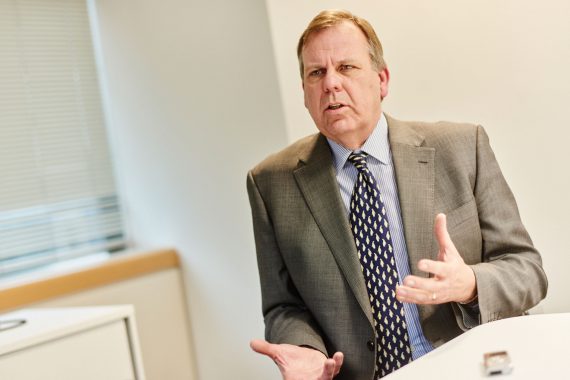‘Everyone wants more money – but we have to be realistic’


dr graham jackson3x2
It’s just over a year since co-commissioning really took off – and Dr Graham Jackson has already set the pace.
Under his leadership, NHS Aylesbury Vale CCG, took the revolutionary step of dropping elements of QOF and binning the unplanned admissions DES that it said was ‘achieving very little’, when it took on joint responsibility for general practice commissioning alongside the local area team last April.
This radical change to funding could be set to spread across England, particularly with another 52 CCGs taking on the responsibility of co-commissioning in April – taking the number commissioning the majority of GP services in 2016/17 to approximately half of all CCGs.
Dr Jackson speaks to Pulse only two months into his new role as co-chair of CCG representative group, NHS Clinical Commissioners.
With his novelty tie, the otherwise unassuming GP is undoubtedly a supporter of traditional general practice, as he shows his passion for co-commissioning and GP involvement in the running of the NHS.
But he is also a harsh realist, refusing to be swayed on his view that GPs will have to take their own responsibility in shaping a financially viable climate locally, rather than await funding increases from the Government.
We have heard some anecdotal complaints from GPs who feel their CCG leaders have conflicts of interest. Is that a problem, and how would you resolve it?
There will be conflicts of interest, potentially, and I think most CCGs, if not all, will be very cognisant to what’s going on. It is difficult sometimes [but] transparency is absolutely key.
Historical relationships may make a difference to how people see their conflicts of interest [but] it is really important that our GP colleagues understand that to make the moves we want to going forward we need to be absolutely clear about where a conflict lies and not allow that to get in the way of delivering enhanced services.
Individual GPs and practices may well have anecdotal issues with certain CCGs but they need to remember that as GPs, [they] are members of the CCG… and should be helping to shape the way the CCG thinks. Unfortunately, some of our colleagues don’t always remember that they have that role.
We have heard of CCGs giving money to practices to federate. Would you say that is a conflict of interest?
I think it depends where the money is coming from and what the money is. Absolutely that needs to be carefully looked at.
If there is money that is facilitating the change in behaviour and it is provider-led innovation, then it is creating the right environment for that healthcare community. Giving money directly to a provider organisation, to a federated group – for their legal framework for example – would be inappropriate.
To what extent can co-commissioning CCGs change or add to the national GP contract?
When it is this dichotomy of being a provider in the same organisation as you are a commissioner, then getting involved in the core contract is a dangerous place to go. That needs to be dealt with at a national level.
To help support primary care in the future we need new funding streams [but] that is about shifting of resources [that] are within the NHS already. So the core contract can be left alone and we can look at additional funding for additional resources appropriately based on the needs of that area.
I think the core GMS contract is something that I wouldn’t want to go near as a CCG lead. There are enough other issues to deal with. I think that is the view of most CCGs, [that] we need to see an enhancement of primary care delivery, and not get involved in the core activity.
When the QOF goes, which is possibly next year by the sounds of things, would you expect most CCGs to develop their own local versions and what might these look like?
I think the whole debate about QOF, from 2017-18 onwards, is still an open discussion. Would there be a [national] replacement? There is some debate about set levels within the QOF – actually for the first two or three years, activity will probably carry on at those sort of levels but, long-term, it needs to be incentivised. I wouldn’t want to pre-judge or pre-guess the outcome there.
How much freedom has NHS England given co-commissioning CCGs so far? Are they often overruled?
It is difficult to answer that for the whole country but I can answer for my CCG. In Aylesbury Vale we have broken the mould on QOF and NHS England has come with us on that journey very effectively. Much like a test case, we have been looked at very carefully, but I would say NHS England has been quite facilitative in that process.
There is a pragmatism that if you make co-commissioning a way forward to change services, then you need to support that direction of travel.
How would you like to see the role of CCGs develop in the future?
I don’t think there is any appetite for legislation change from anyone in the system, so I think CCGs are here to stay for a while. What they have brought is that local clinical leadership and that is what we must make sure we maintain and take forward.
As CCGs come together in pairs or in groups to commission services on bigger footprints… they will share functions where appropriate, and I don’t see why CCGs that are not necessarily co-located could not work together if they have a demography which is… mirrored.
We have one big problem, by the looks of things. There is a large deficit financially, are CCGs underfunded or are they poorly managed? Why is there such a deficit?
CCGs, historically, have not had a deficit. I’m not sure I would want to talk about CCG deficit, I think we need to think of a system fiscal situation.
OK, but put it this way: a lot of CCG leaders out there are really having problems in terms of having to balance the books.
Yes, but then you look at the provider side as well – there’s a big deficit for providers. So we need to recognise that there is a finite amount of fiscal activity, there’s a finite amount of money in the system, health was supported through the spending review to get a reasonably OK settlement compared to other departments…
But they remain underfunded.
The funding is certainly challenging. But actually, there are still efficiencies in the system, there are still ways of delivering things differently, and that’s what we need to do. We need to maintain the quality of our delivery, enhance it, clinically lead it, look at the needs of our population and make sure we spend that money appropriately. Which is why I don’t think it is healthy talking about CCG deficits in isolation.
Health care systems need to understand what their financial arrangements are, and we have a joint responsibility, certainly across health and hopefully across health and social care going forward, to make sure we spend that money appropriately. It’s not my money, it’s not providers’ money, it is OUR money as taxpayers and we have a responsibility to make sure it’s effectively spent.
So we won’t see you asking for more money for CCGs?
Everyone always wants to ask for more money – but actually, where is it? We have to be realistic. Of course, it would be great to have a budget enhancement, but the realistic situation is, that’s the money we’ve been given by government.
I do believe there are still efficiencies in the system, and that’s what we need to make sure we work on. I mentioned earlier that inter-practice and intra-practice variation – if we deal with that, we do improve our quality without spending any money.
Where do you stand on seven-day routine GP appointments and can CCGs afford to fund them?
If you read the detail of the plans going forward it isn’t clear what seven-day working means in primary care. In this year’s planning guidance it does talk about routine appointments being available by 2021, but that clearly can’t happen in addition to all the routine activity that is currently happening in daytime. The workforce isn’t there and we can’t create enough workforce rapidly in that time.
But there has also been debate about whether seven-day working is all about proper access – seeing a qualified GP in an appropriate place, who has full access to your history and medical records – and that is probably more appropriate.
I think the system will have to create seven-day working that is effective, manageable and will provide the service to the patients that the patients need.
But would that be for routine care or urgent care only?
For your routine, long-term conditions management you are often better off having longitudinal relationships, [where you as a GP can] build on what you know [about the patient].
You cannot ask this of those individuals who work seven days. One has to be pragmatic about this and say that an effective and responsive seven-day service is right, but routine care is probably delivered on a shorter time frame.
CV
Age: 51
Education
- Qualified from St Bartholomew’s Hospital Medical School 1987
Career
- 1991 – present GP Partner at Whitehill Surgery, Aylesbury
- 1992 – 2003 Hospital practitioner in psychiatry
- 1994 Founded AYDDOC, one of the earlier Out of Hours GP co-operatives, remained the Medical manager until 2004
- 1995 – present Buckinghamshire LMC
- 2005 – present Treasurer of Bucks & Oxon LMCs
- 2008 – 2012 Chair Vale Health (GP provider company)
- 2009 – 2012 Managing Director Bucks Urgent Care
- 2012 – present Chair of Aylesbury Vale CCG
- 2014 – present board member of NHS Clinical Commissioners;
- April 2016 NHS Clinical Commissioners co-chair
- Present – Vice-Chair of Buckinghamshire Health & Wellbeing Board, member of Strategic Clinical Networks Oversight Committee for Thames Valley and the Oxford AHSN Partnership Council.
Career high
Maintaining his drive and interest (so that he feels he is doing more than just surviving)
Other interests
A keen cyclist and runner. Having a vague idea of what his four daughters are up to.
Pulse July survey
Take our July 2025 survey to potentially win £1.000 worth of tokens











